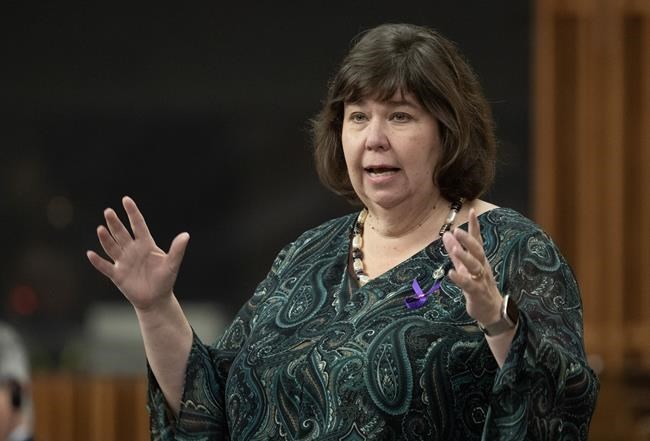OTTAWA — The federal government has announced $1.7 million for groups supporting gender and sexual minorities abroad, while facing criticism from activists that Ottawa is too slow to follow through with its funding promises.
"We know that groups who oppose 2SLGBTQI+ rights are increasingly well-funded and globally co-ordinated," said Liberal MP Anita Vandenbeld, the parliamentary secretary for International Development Minister Ahmed Hussen.
She credited activists for continuing to fight for their rights at great risk instead of seeking refugee status, saying that these people have helped recent progress for minorities in Nepal, Thailand and Dominica.
Vandenbeld was speaking Thursday at a conference of the Dignity Network, a coalition of Canadian groups that support LGBTQ+ people abroad.
Activists from around the world had praise for Canada's various funds and projects to protect vulnerable people. But they said Ottawa's funds move slowly, and urged Canada to be more vocal in responding to anti-gay legislation in some countries.
The funding announced Tuesday includes $1 million for a project led by the U.S. aid department to research how groups in multiple countries can undercut stigma and also respond to crises.
Jay Gilliam, the senior LGBTQI+ coordinator at USAID, praised Canada for supporting the project over recent years. In addition to funding research, he said the money will help activists who are in imminent danger with relocation, medical or legal costs.
"We're really excited that it will be able to cover lots of different places, and meet the challenges that local communities have identified," Gilliam said on the sidelines of the conference.
The rest of the funding is for Toronto-based Rainbow Railroad to examine the forced displacement of gender and sexual minorities worldwide by helping governments understand the perspectives of those fleeing to safety.
The Global Philanthropy Project presented preliminary data for a looming report that ranked Canada third among 16 national governments that fund LGBTQ+ rights abroad, following the U.S. and the Netherlands.
Just 0.2 per cent of Canadian aid was targeted at this population in the fiscal year they studied, ending in spring 2022.
Stephen Brown, a University of Ottawa professor specializing in foreign aid and LGBTQ+ people, said many activists noted that accessing Canadian funding requires reams of paperwork and Zoom calls.
He said delegates compared this to U.S.-based Evangelical groups that easily and quickly channel funds to support anti-gay movements.
"They appreciate Canadian funding, but they're finding that it doesn't always meet their needs," Brown said.
"There are a lot of conditions; it's not nimble. It's often too short-term, so they don't know if they can count on it for a long time, whereas the needs definitely won't go away."
The funding issue was top of mind for delegates from sub-Saharan Africa, who recounted an uptick in mob violence and discriminatory laws.
In early 2019, the Liberals announced funding for LGBTQ+ people abroad, including $15 million for groups in regions where rights are rolling back.
Yet the department says just $1.25 million of that money has reached sub-Saharan Africa, with another $2.8 million not yet spent.
"Africa seems to be underfunded compared to the other regions, despite having stronger needs," Brown said, particularly in French-speaking countries.
Global Affairs Canada said the COVID-19 pandemic and a lengthy consultation process has delayed funding for some groups, but the department plans to ramp up spending.
Meanwhile, activists are also urging Canada to more loudly call out homophobic legislation in countries like Uganda and Ghana.
Pepe Julian Onziema, the program director of Sexual Minorities Uganda, was frustrated that governments didn't speak out more before his country enacted a law a year ago that includes the death sentence for certain types of gay sex.
"We cried across the globe, and nobody took us seriously," he told the conference.
He argued the world's tepid response emboldened other African governments to follow suit. Ghana's parliament has passed a bill, yet to be enacted, that would jail people for identifying as gay.
Brown summarized closed-door conversations over the bill. Global Affairs Canada officials told activists the priority is not to cause harm by speaking publicly, and that their embassies abroad raise human-rights concerns regularly with foreign governments.
"What some of the Africans have said, the Ugandans in particular, was 'Well, you need to talk louder, you need to shout,' and other donors have been playing a more vocal role, such as the U.S. and the World Bank."
This report by The Canadian Press was first published May 9, 2024.
Dylan Robertson, The Canadian Press




